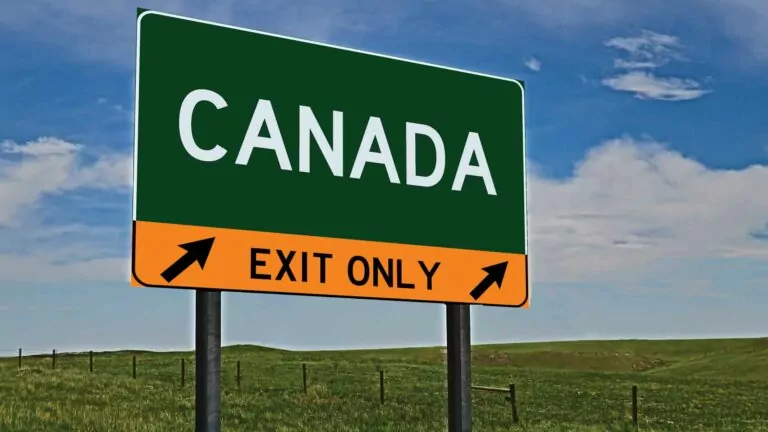I had to answer this question in front of a live, though physically distanced, audience in Toronto in the fall of 2021. The presentation occurred in the midst of numerous Covid restrictions and concerning developments in Canada’s Parliament and legislatures, including a proposal to criminalize “conversion therapy.”
Since then, the hypothetical has become a reality for some Reformed families, who have decided to uproot and move to the USA, and Marty VanDriel is sharing some of their stories in this issue’s feature article. While talk is cheap, action often inspires others to action. Their decisions to leave is provoking many of us to search our hearts and make our own decision about whether to stay or think seriously about relocating.
If I were to follow my heart or even my mind, it wouldn’t be too hard to convince me to move, especially if the new location comes with a warmer climate and a few palm trees thrown in. Yet I also know we are called not to follow simply our hearts, but God’s Word and law (Ps. 119) and to “test the spirits to see whether they are from God” (1 John 4:1). God’s Word makes it clear that whether we stay or leave, what should ultimately motivate us is the furtherance of His kingdom, not our own.
Don’t look for Heaven on Earth
C.S. Lewis once said that “if we find ourselves with a desire that nothing in this world can satisfy, the most probable explanation is that we were made for another world.” So when our hearts long for a better place than Canada, that longing isn’t a bad thing. It only means we are pilgrims, looking for a country of our own (Heb. 11:14).
We just shouldn’t be fooled by the hope that the USA, or any other region of this world, is going to satisfy that longing. The problem with going to a new location is that we take ourselves with us. And that is a problem because “the heart is deceitful above all things and beyond cure” (Jer. 17:9). A change of location doesn’t change our broken condition, as much as we may want it to. Although some places in this world may have more freedom than Canada, there isn’t a place on the planet that is free of the effects of the fall into sin. And even if one location is better than another, it might be just a matter of time before that changes, especially because it will attract people like ourselves, stained with sin even before we were born (Ps. 51).
God wants the Earth filled and the Gospel spread
This doesn’t mean that we have a divine mandate to stay put. On the contrary, God has given humanity two commissions or mandates, and both come with a calling to move.
God’s first instruction to humanity was the cultural mandate to “be fruitful and increase in number; fill the earth and subdue it” (Gen. 1:28). As beautiful as Eden was, God didn’t want Adam and Eve’s children to stay there. They were instructed to inhabit the entire earth. When we fast-forward to Genesis 11, we read about people starting to move eastward and then settling down and deciding to build a city, “otherwise we will be scattered over the face of the whole earth” (Gen. 11:4). In response, God confused their language and “the LORD scattered them from there over all the earth” (11:8). He didn’t want them to get comfortable.
At the end of Christ’s ministry, He gave us another commission – the Great Commission – which once again included a global focus, to “go and make disciples of all nations” (Matt. 28:19). The apostles wasted little time and brought the Gospel throughout the known world. Centuries later, that Gospel reached our forefathers. Without people obeying that call to spread their wings, the Gospel wouldn’t have reached us.
Reaching the world without leaving the country
Canada has recently seen a massive influx of immigration and is set to welcome 500,000 more immigrants every year. That means we don’t need to move to a different continent to reach others. God is sending them to our own neighborhoods. And even though Canada has a Christian heritage, even most of the children growing up in this country don’t know the basics of the Gospel message. In northern BC, where my family currently lives, many communities still don’t have access to faithful Gospel preaching.
When we think about where to settle down, we often look at where our relatives are, where job opportunities may be, and the cost of real estate. These things matter a great deal, as we have to first be responsible for our own families.
But many of us are capable of relocating. In fact, technology has made it easer than ever to work and study in other places. Speaking from my own experience, our family has been able to stay very connected to the family members that we left a thousand kilometers away. So if Canadian Christians are able to move, instead of looking at other countries, why not consider Prince George, BC, Niverville, Manitoba, or Powassan, Ontario? These communities have small Reformed church plants that are eager for more members.
It may not be as attractive to head to communities where the climate is colder, where there aren’t established Reformed schools, and there’s little or no family or friends. But that is how most Reformed communities in Canada started just 50-70 years ago. We already know the language and the culture, we have skills that we can utilize immediately and there are often jobs waiting. In other words, although it may not stir our hearts in the way that a full-time mission position overseas may, moving to these communities is practical and impactful for God’s kingdom.
Seek the welfare of the country where we have been placed
Whether we stay or go, it is helpful to keep in mind that throughout the ages, most of God’s people had little choice about where they would live. They had to work to survive and didn’t have the luxury of uprooting. That is true of many of us today too. Even if we wanted to move to a better country or a different community, it doesn’t mean that country would allow us to come or that a move would work for our spouse or children.
When God’s people were forced to uproot in the Babylonian exile, God’s instruction to them through His prophet was to “build houses and settle down” and “seek the peace and prosperity of the city to which I have carried you into exile“ (Jer. 29:5,7). Regardless of where we settle, these are words we can still take to heart.
God’s people are generally encouraged to “live as a believer in whatever situation the Lord has assigned to them, just as God has called them” (1 Cor. 7:17). But, lest we conclude that God intends that we just accept our situation, only a verse later he tells slaves “Don’t let it trouble you – although if you can gain your freedom, do so” (vs. 21). In other words, we should bloom as kingdom citizens where we are planted, but that doesn’t mean that we need to wilt if the conditions are poor and another good option is possible.
Building off of this, if we are concerned by the direction of our land, we need to “be the change we want to see.” God has given us opportunities to shine our lights in this land and even to serve in institutions and offices of government, or to support those who are. Knowing solid Christians who have answered that call and been willing to serve as MPs, MPPs, town councilors, and leaders in business or other realms, I’m convinced that we can do a better job of encouraging and assisting them in these roles, rather than just criticizing them. It is incredibly difficult to serve as a Christian in a secular land. Let’s help each other rather than tear each other down, discouraging others from serving themselves.
Exceptional circumstances may force a move
The points above apply in times of widespread freedom and safety. But circumstances can change quickly. Jesus experienced this early in His life. His parents were warned to leave Israel when he was still a baby, seeking refuge from political persecution by relocating to Egypt (Matt. 2). When it was safe to move back, his parents were warned in a dream about going to Judea, so they settled instead in Nazareth, the community where Jesus was raised.
And it isn’t just our safety that can change quickly. The same can apply to our spiritual health. We confess that the preaching of the Gospel is one of the two keys of the kingdom of heaven (Lord’s Day 31, Heidelberg Catechism). In other words, we need to be under the preaching. The last two years have made it clear that many of Canada’s leaders simply don’t care much if Christians can’t gather for worship. In my home province, we were told that gathering virtually is a sufficient long-term replacement, even though churches respectfully explained that God’s Word, not the government, should determine what is sufficient when it comes to worship. If it were up to many of our leaders, they would have no problem with shutting down churches for good.
Thankfully, God has restrained wickedness and still allows the freedom to preach the Gospel. This is something to be grateful for and to use while we have it.
Don’t be paralyzed
There is a lot, then, to prayerfully consider. But we shouldn’t get caught up in analysis paralysis. If an opportunity arises where we can best further God’s kingdom and bless our families in a different country or community, and if people who know us well advise us to pursue it, we can embrace the move with enthusiasm, not held back by those who don’t agree or understand. God’s kingdom isn’t limited by earthly borders.
In his superb book, aptly titled Just Do Something, Kevin DeYoung advises:
“we should stop looking for God to reveal the future to us and remove all risk from our lives. We should start looking to God – His character and His promises – and thereby have confidence to take risks for His name’s sake.”
So whether in Canada or beyond, let’s be strong and courageous, taking risks for His kingdom, not our own.
Mark Penninga is the Reformed Perspective’s Executive Director.












